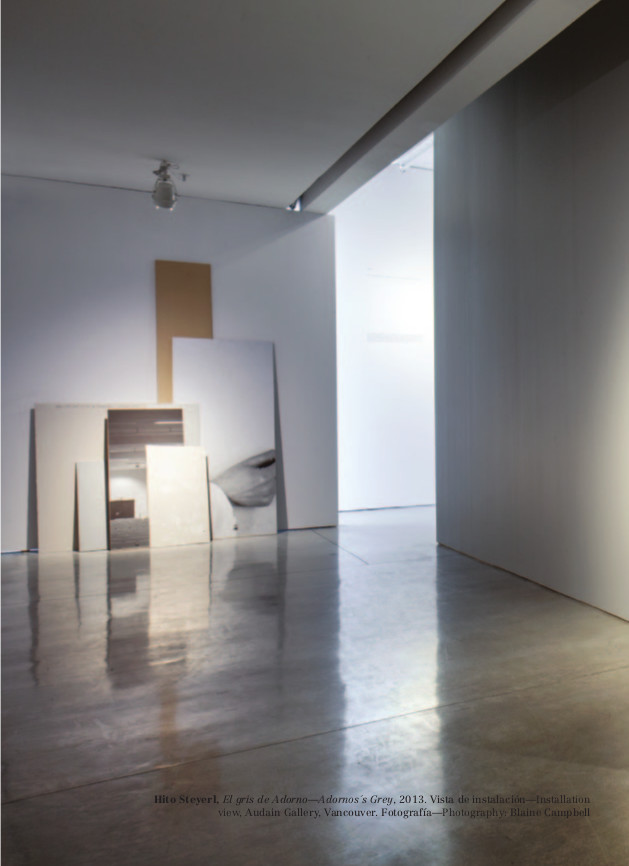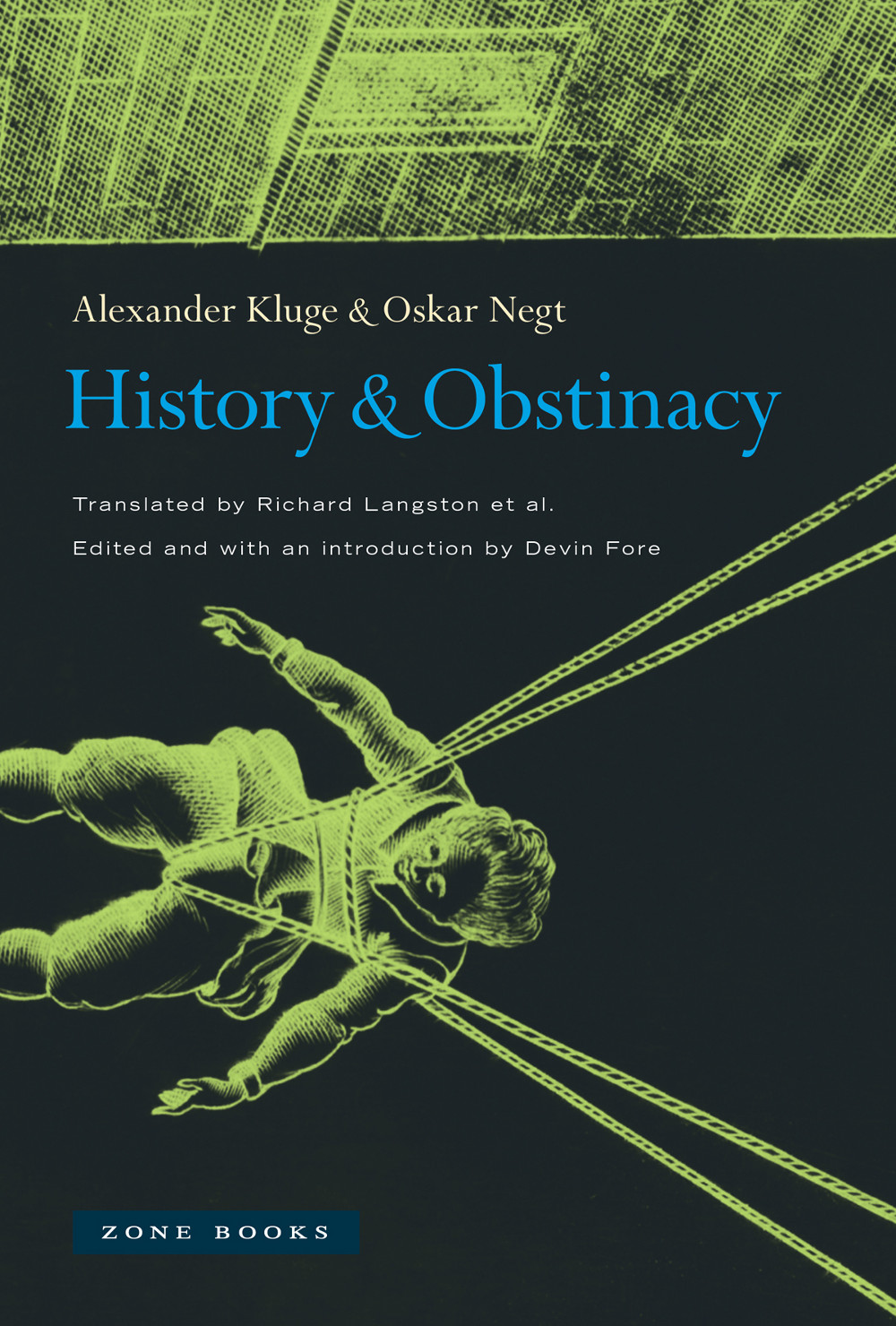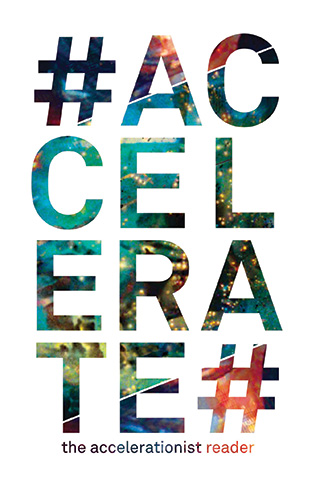Hito Steyerl: Circulacionismo. Circulationism (2014) [English/Spanish]
Filed under book, catalogue | Tags: · art, capitalism, contemporary art, documentary, image, internet, politics, video

“Using video installations and reflection in essays, Hito Steyerl presents a critical apparatus for analyzing the way in which the images produced by television, cinema and contemporary art are inscribed in a visual and economic regime. These are produced, circulated, distributed and consumed in a framework of audiovisual capitalism and form part of different institutional mechanisms of the art world, including the museum. From this perspective, the images are converted into a vehicle of social relations with an ambivalent status insofar as they are both commodity and means of political statement. A second problem raised by the artist is the truth condition of images. Her work repeatedly makes use of appropriated or poor-quality images, together with documentary-type elements, with the aim of questioning the relationship between documentary, reality and representation.”
This book contains Steyerl’s essays “Too much world: Is the Internet dead?” and “Theodore W. Adorno. Timeline”, and the essay “Weather for Liquidity” by Brian Kuan Wood.
Published on the occasion of the exhibition Hito Steyerl: Circulationism held from 27 September 2014 – 1 March 2015 at MUAC in Mexico City which brought together three of her recent works: Adorno’s Grey (2012), Museum as Battlefield (2012) and Liquidity Inc. (2014).
Publisher Museo Universitario Arte Contemporáneo (MUAC), Universidad Nacional Autónoma de México (UNAM), Mexico City, 2014
Folio MUAC series, 23
ISBN 6070257545, 9786070257544
71 pages
Alexander Kluge, Oskar Negt: History and Obstinacy (1981–)
Filed under book | Tags: · capitalism, commodity, knowledge, labour, politics, power, production, time, violence, war, women

“If Marx’s opus Capital provided the foundational account of the forces of production in all of their objective, machine formats, what happens when the concepts of political economy are applied not to dead labor, but to its living counterpart, the human subject? The result is Kluge and Negt’s History and Obstinacy, a breathtaking archaeology of the labor power that has been cultivated in the human body over the last 2,000 years. Supplementing classical political economy with the insights of fields ranging from psychoanalysis and phenomenology to evolutionary anthropology and systems theory, History and Obstinacy examines the complex ecology of expropriation and resistance as it reaches down into the deepest strata of unconscious thought, genetic memory, and cellular life. First published in 1981, this epochal collaboration has now been edited, expanded, and updated by the authors in response to global developments of the last decade to create an entirely new analysis of “the capitalism within us.””
First published as Geschichte und Eigensinn, 3 vols., Zweitausendeins, Frankfurt am Main, 1981.
Translated by Richard Langston et al.
Edited and with an Introduction by Devin Fore
Publisher Zone Books, New York, 2014
ISBN 1935408461, 9781935408468
541 pages
via Baykamber
Reviews: Christopher Pavsek (New German Critique 1996), Stewart Martin (Radical Philosophy 2015), Tara Hottman (Qui Parle 2015), Adrian Wilding (Marx & Philosophy 2015).
PDF (14 MB, updated on 2021-7-12)
Video complements
Robin Mackay, Armen Avanessian (eds.), #Accelerate: The Accelerationist Reader (2014)
Filed under book | Tags: · accelerationism, capitalism, critique, cyberculture, labour, neoliberalism, politics, technology, theory

“Accelerationism is the name of a contemporary political heresy: the insistence that the only radical political response to capitalism is not to protest, disrupt, critique, or détourne it, but to accelerate and exacerbate its uprooting, alienating, decoding, abstractive tendencies.
#Accelerate presents a genealogy of accelerationism, tracking the impulse through 90s UK darkside cyberculture and the theory-fictions of Nick Land, Sadie Plant, Iain Grant, and CCRU, across the cultural underground of the 80s (rave, acid house, SF cinema) and back to its sources in delirious post-68 ferment, in texts whose searing nihilistic jouissance would later be disavowed by their authors and the marxist and academic establishment alike.
On either side of this central sequence, the book includes texts by Marx that call attention to his own ‘Prometheanism’, and key works from recent years document the recent extraordinary emergence of new accelerationisms steeled against the onslaughts of neoliberal capitalist realism, and retooled for the twenty-first century.
At the forefront of the energetic contemporary debate around this disputed, problematic term, #Accelerate activates a historical conversation about futurality, technology, politics, enjoyment and capital. This is a legacy shot through with contradictions, yet urgently galvanized today by the poverty of ‘reasonable’ contemporary political alternatives.”
Publisher Urbanomic, Falmouth, with Merve, Berlin, 2014
ISBN 9780957529557
536 pages
Reviews: Malcolm Harris (New Inquiry), J.J. Charlesworth (Art Review), Simon O’Sullivan (Mute), Alex Andrews (Review31), Orlando Read (Frieze).
Commentaries: McKenzie Wark (Public Seminar), David Cunningham (Radical Philosophy).

